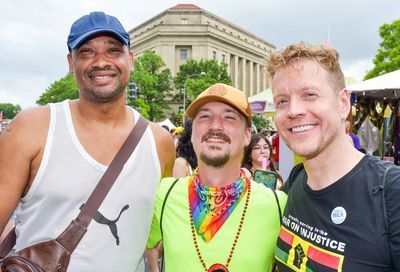Small Victory in Ohio
Commentary: A Town Square Opinion
On July 25, the Ohio Supreme Court ruled 6-1 in Ohio v. Carswell that the anti-gay Marriage Amendment to the state constitution does not invalidate Ohio’s domestic violence law as it applies to unmarried couples. This was welcome as far as it went, but the amendment remains in place, even if the force of its sweeping second sentence — which goes beyond marriage to prohibit any marriage-like legal status — was narrowed. This small victory was not quite dramatic enough to set the Cuyahoga River on fire.
Lambda Legal’s James Madigan said of Carswell, ”The court sent a strong message to those who would attempt to use the amendment to attack health insurance benefits for families, or the relationships between children and their same-sex parents: you can’t get away with this.” Equality Ohio’s Lynne Bowman offered a more mixed assessment: ”We applaud the Court for upholding Ohio’s domestic violence laws. However, this ill-conceived amendment continues to make it hard for loving same-sex partners to care for each other and their families in this state.”
Chief Justice Thomas Moyer’s majority opinion is not entirely convincing. He writes that the amendment bars ”legal status for unmarried persons that bears all of the attributes of marriage,” but the amendment does not say ”all.” It refers to ”the design, qualities, significance or effect of marriage.” The disjunctive ”or” means any of those attributes, not all.
Nonetheless, Carswell effectively rebuffs the bait-and-switch tactics of cultural conservatives, who claimed a narrow purpose during the initiative campaign, then insisted afterward on a broad interpretation denying same-sex couples any legal protection whatsoever. Phil Burress, president of the Ohio group Citizens for Community Values (CCV), for instance, during the 2004 campaign dismissed the idea that the amendment would invalidate parts of the domestic violence law as ”on its face absolutely absurd.” After the amendment’s passage, Burress’ associate David Langdon filed legal briefs, including in Carswell, making that same ”absurd” argument.
At long last, the far right’s mendacity and overreach are backfiring: By reading the Marriage Amendment narrowly to preserve protections against domestic violence for unmarried partners, Carswell sets a precedent for allowing other gay-friendly protections such as domestic partner benefits for state university employees.
Alternatively, had the Court upheld the conservatives’ claim that the amendment invalidated the domestic violence law, it would have marked the amendment unconstitutional. The U.S. Supreme Court reaffirmed in Lawrence v. Texas in 2003 that the state may not use traditional morality to draw distinctions in the criminal law between married and unmarried couples.
Marc Spindelman, an Ohio State University law professor and an expert in constitutional law and lesbian and gay rights, stated after the ruling, ”The Court does not say so expressly, but it has effectively promised that the Marriage Amendment will be read in a way that’s conditioned by reason, not inflamed by the passions of traditional morality. In this sense, Carswell may, in time, turn out to have been the beginning of the end of the Marriage Amendment itself.”
Spindelman suggests that Carswell will be of greatest interest in the 13 states whose gay marriage bans are framed in a broad way like Ohio’s: Arkansas, Kentucky, Louisiana, Michigan, Nebraska, North Dakota, Oklahoma, South Carolina, South Dakota, Texas, Utah, Virginia and Wisconsin.
Spindelman told me, ”On the upside, the Court gave us more than most close observers thought we could get. On the downside, the Court left us with a legal version of Jenga [the wooden-block, tower-building game], where we need to figure out what the definition of ‘all’ [the attributes of marriage] is so we stay within Carswell‘s terms.”
Spindelman criticizes Lambda Legal for focusing only on narrowing the amendment’s effect instead of disputing the constitutionality of a broader interpretation, or making an affirmative case for gay couples. ”It is possible to challenge the Marriage Amendment at both the retail and the wholesale level. Lambda has exclusively pursued a retail approach — in popular parlance, death by a thousand paper cuts — and I see no good reason why. It was the women’s domestic violence coalition brief that tried to craft an argument on behalf of lesbian and gay victims of domestic abuse-not the Lambda brief.”
Differences over strategy aside, Spindelman is upbeat. He presciently warned in Legal Times last year that Carswell would ”teach cultural conservatives a lesson the anti-domestic-violence movement has been teaching abusers for years: There’s a price to pay for the moral hubris it takes to treat people as pawns in your own game.” And so Carswell has.
Richard J. Rosendall is a writer and activist whose work has appeared on Salon.com and the Independent Gay Forum (www.indegayforum.org). He can be reached at rrosendall@starpower.net.
Support Metro Weekly’s Journalism
These are challenging times for news organizations. And yet it’s crucial we stay active and provide vital resources and information to both our local readers and the world. So won’t you please take a moment and consider supporting Metro Weekly with a membership? For as little as $5 a month, you can help ensure Metro Weekly magazine and MetroWeekly.com remain free, viable resources as we provide the best, most diverse, culturally-resonant LGBTQ coverage in both the D.C. region and around the world. Memberships come with exclusive perks and discounts, your own personal digital delivery of each week’s magazine (and an archive), access to our Member's Lounge when it launches this fall, and exclusive members-only items like Metro Weekly Membership Mugs and Tote Bags! Check out all our membership levels here and please join us today!

























